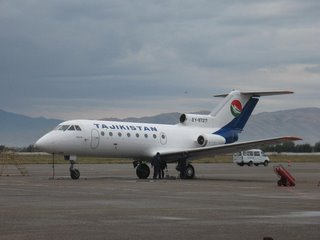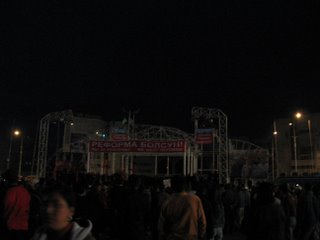On the road to Uzbekistan
From
As mentioned before,
And, as if this were not absurd enough, the governments of
But, back to our trip:
Because we could not fly from
 Flying on the history of aviation continued. This time, it was a Yak-40.
Flying on the history of aviation continued. This time, it was a Yak-40. The entrance is under the tail fin. A just married couple went on their honeymoon, so there was
The entrance is under the tail fin. A just married couple went on their honeymoon, so there was 
Having arrived in Khujand,

we took a car (suitable version of a small

The border crossing looked more like market, than like an n official border crossing point. The taxi drivers, who were standing around waiting for clients told us, that this crossing point was under a bilateral agreement, only for Tajiks and Uzbeks, which meant, that me and our project manager couldn’t cross the border. While he and Khushnid went to the border post to reconfirm this information, Khushnid's daughter was having her fun with my glasses.

Indeed, not even for "additional money" could we pass the border. That meant that we had to take another taxi to the official border crossing point in Ozbek. The new taxi was not a Jeep but an old Lada, for 5 adults (driver included) and a 2,5 year old girl.
The traffic on the road was sometimes relatively heavy...
 and considering that this was the "main highway" from
and considering that this was the "main highway" from  If was a three hours journey and of course we stopped at a "rest aria", to get some food :-)
If was a three hours journey and of course we stopped at a "rest aria", to get some food :-)
After having to argue for the price, the taxi driver suddenly decided to raise, when we arrived at the border post we finally left the territory of Tajikistan. From the Tajik border post you have to walk for about 50 meter to the Uzbek border post's gate. (The gate to paradise?)

The people had to wait at the gate (sometimes for hours) to be allowed to "get in". Some of them, who have good connections to the border post, of course don't. The international organization's status allowed us to "get in" after one hour. But while we were not allowed to pass the border on the first border post, Khushnid's 2,5 year old daughter was not allowed to pass the border here because her name was not included in Khushnids visa.
We had to pass the border alone, while Khushnid and his family had to return to the first border post, where their daughter could pass the border without a visa, because he knew somebody working there.
After having passed the gate, the entry procedure was surprisingly easy, not at least due to our European passports. In














